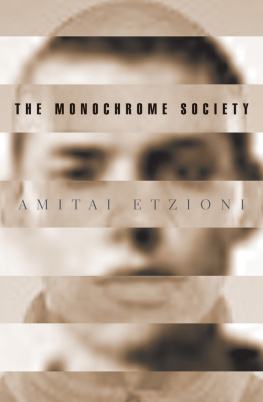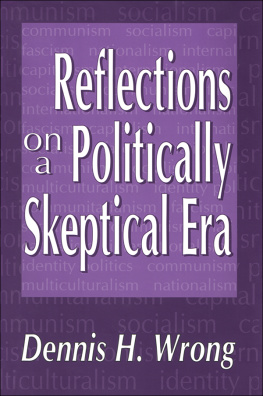The Monochrome Society
| NEW FORUM BOOKS |  | Robert P. George, Series Editor |
| A list of titles in the series |
| appears at the back of the book |
AITAI ETZIONI
The Monochrome Society
PRINCETON UNIVERSITY PRESS PRINCETON AND OXFORD
Copyright 2001 by Princeton University Press
Published by Princeton University Press, 41 William Street, Princeton, New Jersey 08540
In the United Kingdom: Princeton University Press, 3 Market Place, Woodstock,
Oxfordshire OX20 1SY
All Rights Reserved
Second printing, and first paperback printing, 2003
Paperback ISBN 0-691-11457-9
The Library of Congress has cataloged the cloth edition of this book as follows
Etzioni, Amitai.
The monochrome society / by Amitai Etzioni.
p. cm. (New forum books)
Includes index.
ISBN 0-691-07090-3 (cloth : alk. paper)
eISBN 978-0-691-22540-1
1. United StatesMoral conditions. 2. United StatesSocial conditions. 3. Social valuesUnited States. 4. Social problemsUnited States. I. Title. II. Series.
HN90.M6 E79 2001
306.0973dc21 00-048323
British Library Cataloging-in-Publication Data is available
https://press.princeton.edu
R0
To my multicultural, monochromic family.
ACKNOWLEDGMENTS
I am indebted to Jennifer Ambrosino and Mary Wilson for editorial assistance and to Natalie Klein, Rachel Mears, and Joanna Cohn for research assistance. Professors Dennis Wrong and Eva Elizur made several very helpful comments on a previous version of this collection. Andrew Volmert greatly helped in final preparation of this volume.
All the chapters included in this volume were previously published essays, but all were modified, revised, or extended for the purpose of this volume. An earlier version of written with my son, Oren Etzioni, Professor of Computer Science at the University of Washington, was first published in The Information Society, Vol. 15, No. 4 (October-December 1999), pages 241-248. A much shorter version appeared as an editorial in Science, Vol. 277 (July 18, 1997), page 295. When I revisited cyberspace two years after the joint essay was completed, I found significant new developments, which I recorded in E-communities Build New Ties, but Ties that Bind for the New York Times (February 10, 2000, page E7), and added here.
While the first four chapters are couched in less technical terms, the rest are written more in the terms employed by social scientists and social philosophers. Suffer the Children () was published in Contemporary Sociology, Vol. 29, No. 1 (January 2000), pages 188-195, as Creating Good Communities and Good Societies.
Social Norms: The Rubicon of Social Science () first saw the light of day as A Communitarian Note on Stakeholder Theory in the Business Ethics Quarterly, Vol. 8, Issue 4 (October 1998), pages 679-691.
INTRODUCTION
One theme runs through the chapters in this volume: the concern with social virtues and the social foundations on which they rest. The chapters deal with the ways societies determine what they consider virtuous, and with the tension between individual rights and social characterizations of the good. Above all, the chapters examine the social foundations and processes that make people better than they would be otherwise.
Many used to hold that virtues do not constitute a proper subject for a social scientist, and some still do. Social science was supposed to be value-free, to be scientific. However, there is nothing unscientific about finding the conditions under which virtue is nourished versus those in which it is undermined. Additionally, social science cannot be value-neutral. Whether it studies the relations between people of difference races, classes, genders, or nationalities, it inevitably deals with matters that entail value judgments. The same holds when the subjects of study are the alternatives society faces when dealing with those who violate its moral (and legal) precepts, and of course when the subject is the ultimate purpose of life in hyper-materialistic societies. Value judgments, though, should not be confused with being arbitrary declarations of one's values. The discipline of ethics is all about justifying the judgments we render. In this sense, these chapters cross the line between sociology and ethics (and maybe some other parts of social philosophy).
Why draw on the term virtues when social scientists often prefer to use the term values? Because values have acquired a rather relativistic connotation. Social scientists write about American values, Afrikaner values, and fascist values as if they were all of a kind. A value is a value is a value. Virtues evoke a firmly anchored conception of the good. No one will speak of Nazi virtues, I hope. In effect, the term serves to flag that there are, as the Founding Fathers put it so well, some self-evident truths. This is the way I use the term in the following pages.
The chapters are all Weberian in one limited sense: they assume that beliefs play an important role in history and society. Max Weber whose work must be largely understood in the context of a grand and prolonged debate of European intellectuals with Karl Marxdid not maintain that economic and technological forces are unimportant. Weber merely was able to show that these forces are not dominant, but that they are only one of the factors that shape history and society. The other forcesvalues, moral commitments, shared understandingsdefine the area in which these chapters fall. To put it differently, the chapters assume that society cannot be understood or changed without attention to its and our normative facets.
The points made in the following chapters are made in two voices: that of the public intellectual and that of the academic. I have spent a lifetime trying to speak in both voices, addressing my colleagues while also reaching for a wider audience. While the voice changes as different audiences are addressed, the points do not. All speak to the condition of our society: the developments that brought us here, where these may carry us unless we change course, as well as where we might do well to stay the course.
The volume opens with an exploration of the relationship among racial and ethnic groups that make up American society. I turned to this subject when I read repeatedly that a considerable number of public leaders and colleagues believe that American society is in the process of being deeply transformedfrom being a European-dominated society to one governed by a majority of minorities. Black, Latino, and Asian AmericansI readwill become the majority of the country's population sometime after the year 2050 and will carry us in fundamentally new directions, compatible with their values and interests. I found that those who foresee such a turn are inadvertently racists, because they assume that people's pigmentation will determine their personal, social, and political views and actions. I show herein that the vast majority of all Americans, whatever their background or race, basically hail the same virtues and have the same dreams and aspirations. Moreover, far from growing apart, we are coming together through intermarriage and other processes to be discussed. America does not make homogenization a virtue, but neither does it employ apartheid of any kind or color. The record shows that, in American society, diversity continues to be well contained by unity. We are much more a monochrome society than a rainbow society, or one in which colors do not mix and there is no place for white (











